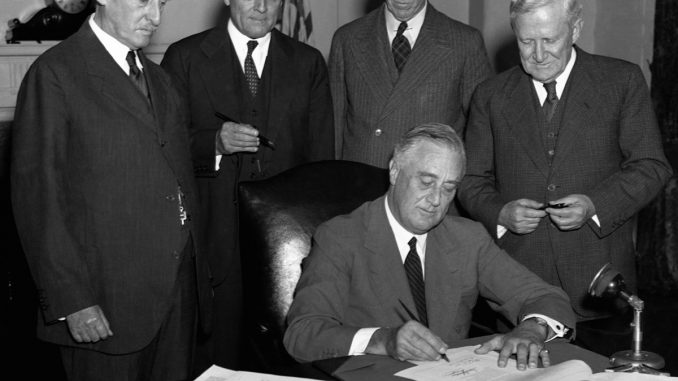

On June 22, 1944, U.S. President Franklin D. Roosevelt signs the G.I. Bill, an unprecedented act of legislation designed to compensate returning members of the armed services–known as G.I.s–for their efforts in World War II.
As the last of its sweeping New Deal reforms, Roosevelt’s administration created the G.I. Bill–officially the Servicemen’s Readjustment Act of 1944–hoping to avoid a relapse into the Great Depression after the war ended. FDR particularly wanted to prevent a repeat of the Bonus March of 1932, when 20,000 unemployed veterans and their families flocked in protest to Washington. The American Legion, a veteran’s organization, successfully fought for many of the provisions included in the bill, which gave returning servicemen access to unemployment compensation, low-interest home and business loans, and–most importantly–funding for education.
By giving veterans money for tuition, living expenses, books, supplies and equipment, the G.I. Bill effectively transformed higher education in America. Before the war, college had been an option for only 10-15 percent of young Americans, and university campuses had become known as a haven for the most privileged classes. By 1947, in contrast, vets made up half of the nation’s college enrollment; three years later, nearly 500,000 Americans graduated from college, compared with 160,000 in 1939.
As educational institutions opened their doors to this diverse new group of students, overcrowded classrooms and residences prompted widespread improvement and expansion of university facilities and teaching staffs. An array of new vocational courses were developed across the country, including advanced training in education, agriculture, commerce, mining and fishing–skills that had previously been taught only informally.
The G.I. Bill became one of the major forces that drove an economic expansion in America that lasted 30 years after World War II. Only 20 percent of the money set aside for unemployment compensation under the bill was given out, as most veterans found jobs or pursued higher education. Low interest home loans enabled millions of American families to move out of urban centers and buy or build homes outside the city, changing the face of the suburbs.
Over 50 years, the impact of the G.I. Bill was enormous, with 20 million veterans and dependents using the education benefits and 14 million home loans guaranteed, for a total federal investment of $67 billion. Among the millions of Americans who have taken advantage of the bill are former Presidents George H.W. Bush and Gerald Ford, former Vice President Al Gore and entertainers Johnny Cash, Ed McMahon, Paul Newman and Clint Eastwood.
READ MORE: How the GI Bill’s Promise Was Denied to a Million Black WWII Veterans





Be the first to comment